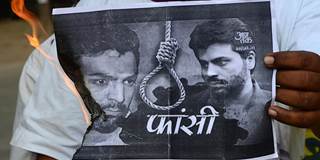The execution of Yakub Memon for complicity in the serial bomb blasts that killed 257 people in Mumbai in 1993 was widely supported in India. But, however tempting it may be to declare that anyone who kills innocent people deserves to die, revenge is not a worthy motive for a state's actions.
NEW DELHI – On July 30, Yakub Memon, a chartered accountant and the brother of a notorious gangster now living in self-imposed exile, was hanged for complicity in the planning and execution of serial bomb blasts that killed 257 people in Mumbai in 1993. The hanging, India’s first in three years, has prompted reactions ranging from dismay to scarcely concealed bloodlust. And it has intensified the domestic debate over the death penalty.

NEW DELHI – On July 30, Yakub Memon, a chartered accountant and the brother of a notorious gangster now living in self-imposed exile, was hanged for complicity in the planning and execution of serial bomb blasts that killed 257 people in Mumbai in 1993. The hanging, India’s first in three years, has prompted reactions ranging from dismay to scarcely concealed bloodlust. And it has intensified the domestic debate over the death penalty.